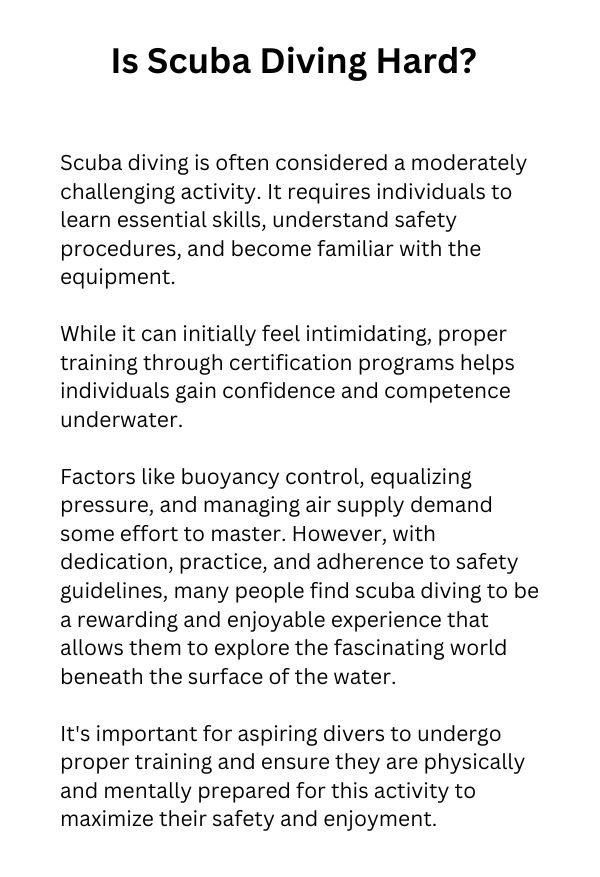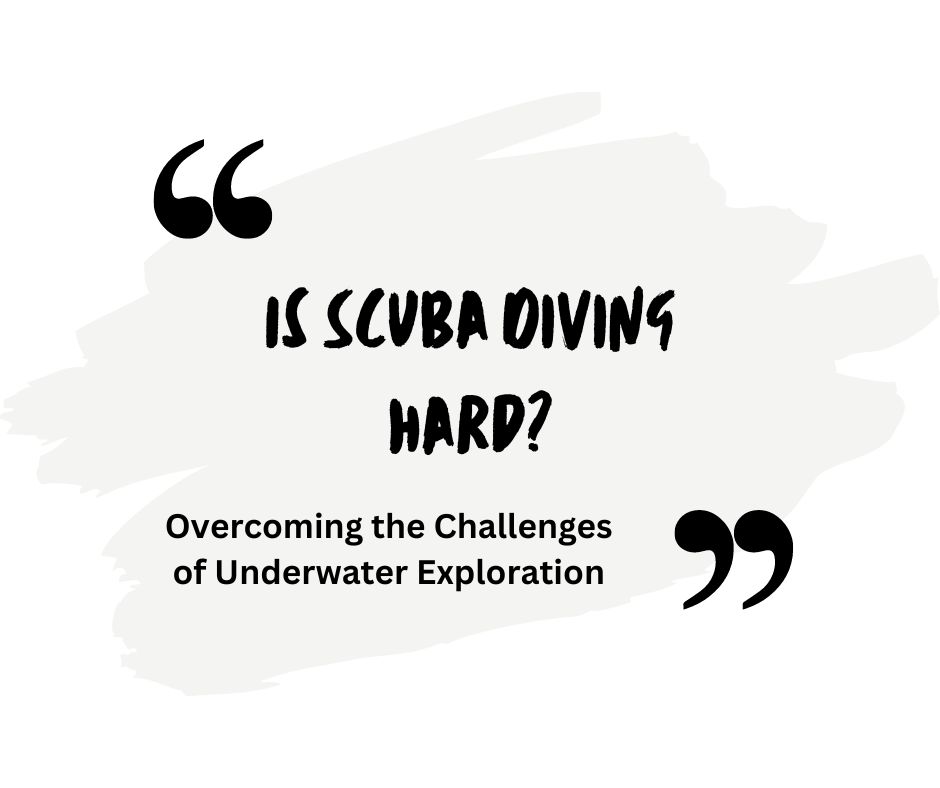Yes, scuba diving can be challenging for beginners, but it becomes easier with training and experience.
Scuba diving is a captivating activity that opens the door to a world of underwater wonder. Yet, for those considering taking the plunge into this aquatic adventure, one common question often arises: “Is scuba diving hard?” While it may seem daunting at first, scuba diving offers unique rewards that make overcoming its initial challenges more than worth the effort. In this article, we will explore the perceived difficulties of scuba diving and provide insights to help aspiring divers succeed in this thrilling endeavor.
The Initial Challenges of Scuba Diving
Equipment and Gear
At first glance, scuba diving gear can appear complex and intimidating. Wetsuits, masks, regulators, tanks, and buoyancy control devices (BCDs) may seem like a lot to handle. Learning to properly assemble, use, and maintain this equipment can be challenging.
Buoyancy Control
Achieving and maintaining neutral buoyancy is a critical skill in scuba diving. It can be tricky for beginners to find the perfect balance, and it’s common to struggle with over- or under-inflating the BCD.
Equalizing Pressure
Equalizing pressure in the ears and sinuses is essential to avoid discomfort and injury. For some, equalization can be challenging, particularly during descents.
Safety and Responsibility
Scuba diving comes with a set of safety protocols, and new divers must learn to manage potential risks. This responsibility can feel overwhelming at first.
Overcoming the Challenges
Quality Training
The key to mastering scuba diving is quality training. Enrolling in a reputable diving course with certified instructors is essential. These courses cover equipment use, buoyancy control, equalization techniques, and safety procedures.
Practice and Patience
Scuba diving, like any skill, requires practice. Be patient with yourself and allow time to improve your buoyancy control and equalization techniques. The more you dive, the more confident and comfortable you will become.
Proper Equipment Maintenance
Learn how to clean, store, and maintain your scuba gear. Regular maintenance ensures your equipment functions properly and safely.
Dive with Experienced Divers
Diving with experienced buddies or guides can provide valuable guidance and support. They can offer tips, share their experiences, and enhance your overall diving knowledge.
Gradual Progression
Start with shallow, calm-water dives and gradually work your way up to more challenging environments. Gaining experience and confidence in easier conditions will better prepare you for advanced diving.
The Rewards of Scuba Diving
While scuba diving may present initial challenges, the rewards are numerous:
- Underwater Beauty: Witnessing vibrant coral reefs, marine life, and shipwrecks is a unique and awe-inspiring experience.
- Stress Relief: Diving promotes relaxation, reduces stress, and allows you to escape into a tranquil underwater world.
- Physical Activity: Scuba diving offers an enjoyable way to stay active and healthy.
- Adventure and Exploration: Each dive is a new adventure, and diving provides opportunities for exploration and discovery.
- Community: Divers often find a sense of community and camaraderie among fellow enthusiasts.

FAQ
Can anyone learn to scuba dive, regardless of age or physical condition?
Most people can learn to scuba dive, but there are medical and physical requirements. Divers should be in good health and able to meet basic fitness standards. Age restrictions vary by training agency.
Is it essential to be a strong swimmer to scuba dive?
While being a strong swimmer is beneficial, it’s not a strict requirement for scuba diving. However, divers should be comfortable in the water and capable of swimming short distances.
How long does it take to become a certified diver?
The duration of scuba training can vary depending on the course and the student’s progress. An Open Water Diver course typically takes several days, including classroom instruction, pool or confined water training, and open water dives.
In conclusion, while scuba diving may seem challenging at first, it offers unique rewards and the opportunity to explore the incredible underwater world. Overcoming the initial difficulties is part of the journey, and with proper training, practice, and patience, aspiring divers can discover the beauty and excitement that scuba diving has to offer.
